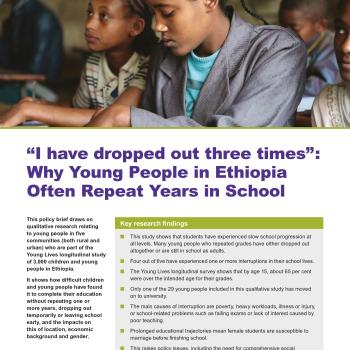
This policy brief draws on qualitative research relating to young people in five communities (both rural and urban) who are part of the Young Lives longitudinal study of 3,000 children and young people in Ethiopia.
It shows how difficult children and young people have found it to complete their education without repeating one or more years, dropping out temporarily or leaving school early, and the impacts on this of location, economic background and gender.
This policy brief is based on the following working paper: Tafere, Y. and A. Tiumelissan (2020) Slow Progression: Educational Trajectories of Young Men and Women in Ethiopia, Young Lives Working Paper 192. Oxford: Young Lives. It is one of a set of eight policy briefs summarising key findings and policy implications from eight corresponding working papers based on the research for the Young Lives fifth-wave qualitative survey in 2019.

This policy brief draws on qualitative research relating to young people in five communities (both rural and urban) who are part of the Young Lives longitudinal study of 3,000 children and young people in Ethiopia.
It shows how difficult children and young people have found it to complete their education without repeating one or more years, dropping out temporarily or leaving school early, and the impacts on this of location, economic background and gender.
This policy brief is based on the following working paper: Tafere, Y. and A. Tiumelissan (2020) Slow Progression: Educational Trajectories of Young Men and Women in Ethiopia, Young Lives Working Paper 192. Oxford: Young Lives. It is one of a set of eight policy briefs summarising key findings and policy implications from eight corresponding working papers based on the research for the Young Lives fifth-wave qualitative survey in 2019.

